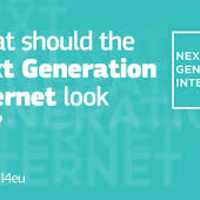Next Generation Internet Initiative
An opportunity to fix the internet

The new Next Generation Internet initiative could be the first real opportunity to put large scale public funding to work to really fix the internet. With an order of magnitude of hundreds of millions of euro in research, development and engineering effort it can actually be a major step toward reaching the post-Snowden internet we want. NLnet Foundation and Gartner Europe that wrote the strategic vision for the Next Generation Internet initiative will present the work they did in a unique collaboration which sought the expertise of key organisations and communities in the field - like RIPE (the European regional internet registry), GÉANT (research networks), the European assocation of country domain name organisations, ISP associations, the internet exchanges, the open source community (FSFE), the digital civil rights community (EDRi) and Internet Society. So not just the separate communities that operate different 'layers' (or rather slices) of the technology but also what we consider 'ethical guardians' of the internet.
2018 celebrates the fifth anniversary of the Edward Snowden revelations. Full details about covert mass scale surveillance at internet scale stripped the internet naked of every romantic assumption we held about it. The news sent a transformative shock throughout the global technology community. We were all convinced the internet would soon fix these horrible security shortcomings now that we knew - although naivity was destroyed and the internet would never be the same again.
The world has fast forwarded itself five years. We must conclude - with some sadness - that the internet was not fixed for us. We are still waiting for major structural change. To the regular end user, a safe and secure 'post-Snowden' internet is far away: in day to day usage they still by and large have to use the same unfixed and insecure internet we had before.
In fact, things in some areas have gotten worse as other actors besides foreign state agencies have gained immense powers over us. We are now asked by social networks to turn all our nude pictures over to them voluntarily so they may protect us.
One reason for this sad state of affairs, is that it has take time to follow up the Snowden revelations by adequate political measures. And to be frank, it took a while for public funding organisations in Europe to even understand their crucial role in this. The internet is not going to fix itself. Many of the more promising efforts in this realm have been 'bottom up' efforts from individuals or small teams, but these isolated efforts miss critical mass to actually scale up and change the mainstream internet.
The new Next Generation Internet initiative could be the first real opportunity to put large scale public funding to work to really fix the internet. With an order of magnitude of hundreds of millions of euro in research, development and engineering effort it can actually potentially change the balance of power. The Europen Commission (where the money for NGI originates) did not try to invent such a strategy by: it invited NLnet Foundation and Gartner Europe to write a strategic vision for the Next Generation Internet and identify what needs to be done to really move the internet forward. NLnet Foundation is an independent public benefit organisation which was set up by pioneers of the European internet in the eighties, and which has been funding key open source initiatives for over two decades. Gartner Europe is an equally independent consulting company that knows what is being decided in board rooms before anyone else.
In a unique collaboration they sought the expertise of key organisations and communities in the field - like RIPE (the European regional internet registry), GÉANT (research networks), the European assocation of country domain name organisations, ISP associations, the internet exchanges, the open source community (FSFE), the digital civil rights community (EDRi) and Internet Society. So not just the separate communities that operate different 'layers' (or rather slices) of the technology but also what we consider 'ethical guardians' of the internet.
The NGI initiative has learned from the enormous failures of the past five years. Gone will be the need to create artificial consortia. Gone will be a lot of the bureaucratic paperwork. There is a clear vision. There is a plan. And there is money to fund the right things. Open source is seen as the key mechanism to make it actually happen, and the first calls for funding from the NGI initiative are out. Now what is needed is the developers to seize the opportunity to scale up and more importantly to connect their initiatives.
Fixing the internet is a 'moonshot plus' effort: the internet is the largest technical structure man has ever made, and the task at hand is to vastly improve its very operating fabric with 3 billion + people using it on a daily basis. This may essential to our daily operations, but it is equally or even more important for upholding our human values and basic human rights in Europe. In addition to new open source technology this will also require a larger political agenda of Europe as an integral part of the approach too - in some cases regulating the most predatory behaviour from bad actors might be necessary to restore health back to the internet.
Speakers
| Rob van Kranenburg | |
| Michiel Leenaars | |
| Marietje Schaake | |
| Georgios Tselentis |